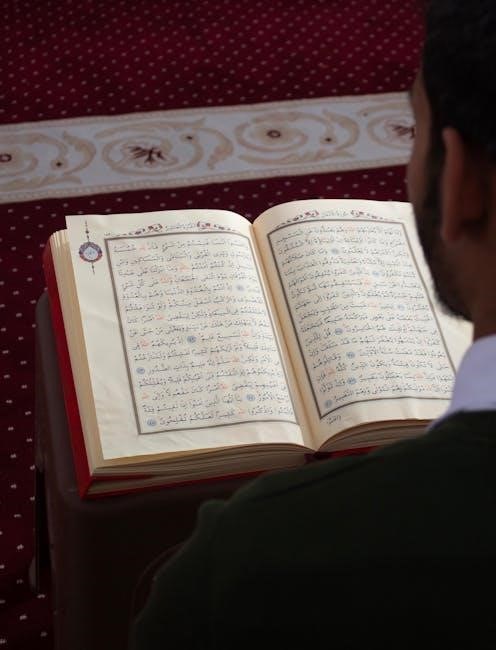The UMC Book of Discipline is the foundational document guiding the doctrine, governance, and ministry of the United Methodist Church.
It outlines sacred principles, policies, and practices, ensuring unity and accountability across the global connection.
Purpose and Importance of the Book of Discipline
The UMC Book of Discipline serves as the legal and doctrinal foundation for the United Methodist Church, outlining its principles, policies, and practices. It ensures unity, accountability, and fidelity to the church’s mission, providing guidance for clergy, laity, and conferences. Its purpose is to maintain the church’s integrity and connectional covenant, reflecting Wesleyan traditions and adapting to contemporary challenges.
The Connectional Covenant in the UMC
The Connectional Covenant unites all levels of the UMC—local churches, districts, and conferences—through shared doctrine, discipline, and mission. It ensures mutual support, accountability, and cooperation, reflecting the church’s Wesleyan heritage. This covenant balances unity with local church rights, fostering a global connection while respecting contextual diversity, ultimately strengthening the church’s collective witness and ministry.
History of the UMC Book of Discipline
The UMC Book of Discipline originated in 1784 with the Methodist Episcopal Church and is updated every four years, reflecting the church’s evolving governance and standards.
Origins and Evolution of the Book of Discipline
The UMC Book of Discipline traces its origins to 1784, emerging from the Methodist Episcopal Church. It has evolved through periodic updates, reflecting the church’s growth and theological shifts. Originally influenced by John Wesley’s teachings, the book has been refined at each General Conference, ensuring it remains relevant while maintaining the church’s core values and connectional identity.
Key Historical Developments in the Book of Discipline
The Book of Discipline was first published in 1784, establishing the Methodist Episcopal Church’s doctrine and governance. It has been updated quadrennially since, reflecting the church’s evolution and societal changes. The 2016 edition introduced significant updates to the church’s Constitution, Doctrine, and Social Principles, while the 2020/2024 edition addressed modern challenges and maintained the church’s foundational values.
Key developments include the merger forming The United Methodist Church in 1968 and the inclusion of Global Social Principles in 2016. The 2024 edition incorporates changes from the General Conference, ensuring the book remains a vital guide for the church’s mission and ministry worldwide.

Structure and Content of the Book of Discipline
The UMC Book of Discipline contains the Constitution, Doctrine, General Rules, and Social Principles. It outlines governance, mission, and ministry practices for the church globally.
Overview of Sections and Chapters
The UMC Book of Discipline is organized into sections covering doctrine, governance, and ministry. Chapters detail church structure, clergy roles, local church operations, and social principles, providing clear guidance for United Methodist practices and policies.
Key Doctrines and Social Principles
The UMC Book of Discipline outlines core doctrines such as grace, salvation, and holiness, shaping Methodist theology. It also presents social principles addressing justice, equality, and compassion, guiding the church’s stance on contemporary issues. These principles reflect the church’s commitment to social holiness and its mission to transform the world.

Recent Changes and Updates
2020/2024 Edition Highlights
The 2020/2024 UMC Book of Discipline reflects significant updates, including shifts in polity, disaffiliation policies, and clergy roles. Key changes address church unity, mission alignment, and adaptive governance. These revisions aim to equip the church for modern challenges while maintaining its theological foundations.
The 2020/2024 UMC Book of Discipline introduces significant updates, including revised disaffiliation policies under Paragraph 2553 and adjustments to clergy roles. It also addresses global adaptations, reflecting the church’s diverse contexts. These changes aim to foster unity, clarify governance, and equip the church for contemporary challenges while maintaining its core doctrines and mission focus. The edition is available in PDF format for easy access.
Significant Revisions and Their Implications
The 2020/2024 edition includes revisions to Paragraph 2553, streamlining disaffiliation processes, and updates to clergy accountability measures. These changes reflect ongoing debates about church unity and doctrine. The revisions aim to provide clarity and flexibility, addressing contemporary issues while maintaining the church’s foundational principles and mission. The implications are far-reaching, influencing local churches, conferences, and the global connection.
Publishing and Availability
The UMC Book of Discipline is officially published by Cokesbury in hardcover, PDF, and EPUB formats. It is available on the Cokesbury website and other online retailers.
Official Publishers and Editions
The United Methodist Publishing House, through Cokesbury, is the official publisher of the Book of Discipline. It is available in various editions, including hardcover, bonded leather, and digital formats like PDF and EPUB. The 2020/2024 edition reflects the latest updates from the General Conference, ensuring the text remains relevant and authoritative for the church’s governance and ministry.
How to Access the Book of Discipline in PDF Format
The UMC Book of Discipline in PDF format can be purchased through Cokesbury, the official retailer of United Methodist resources. Visit their website, browse to the Book of Discipline section, and select the PDF option. This digital format allows easy access and portability, ensuring clergy and laity can reference the text on various devices for study, reflection, and governance.

The Role of Clergy and Laity
Clergy and laity share responsibilities in upholding the doctrine, governance, and mission of the United Methodist Church, as outlined in the Book of Discipline.
Mandated Roles and Responsibilities
The Book of Discipline outlines specific roles for clergy and laity, ensuring effective church governance and ministry. Clergy are mandated to preach, teach, and provide spiritual leadership, while laity are responsible for living out their faith in daily life and supporting the church’s mission. Together, they work to fulfill the church’s purpose of making disciples of Jesus Christ for the transformation of the world.
Expectations for Clergy and Laity
The UMC Book of Discipline outlines clear expectations for both clergy and laity, emphasizing their shared commitment to living out the church’s mission. Clergy are expected to provide spiritual leadership, preach the gospel, and administer sacraments, while laity are called to live as disciples in their daily lives and support the church’s ministries. Both are held accountable for upholding the church’s teachings and practices with integrity.
Disaffiliation Policies
Paragraph 2553 of the UMC Book of Discipline provides a process for local churches to disaffiliate under specific conditions, with implications for conferences and church property;
Paragraph 2553 and Its Implications
Paragraph 2553 outlines the process for local churches to disaffiliate from the UMC, requiring a two-thirds majority vote and approval from the annual conference. This provision, adopted in 2019, was set to expire on December 31, 2023. It allows churches to leave while maintaining property ownership, but requires paying unfunded pension liabilities and other financial obligations. This policy reflects the UMC’s efforts to address internal divisions and facilitate orderly separation for congregations seeking to depart the denomination.
Impact on Local Churches and Conferences
The disaffiliation process strains local church resources, requiring significant financial and administrative efforts. Congregations face emotional divides, while conferences must manage the loss of membership and revenue. This shift challenges conferences to redefine their roles and support remaining churches, ensuring continuity in ministry amid structural changes. The broader implications underscore the need for adaptive leadership and unity within the UMC.

Social Principles and Their Significance
The UMC Book of Discipline’s Social Principles emphasize justice, equality, and compassion, guiding the church’s mission to transform the world through Christ’s teachings.
Core Values and Teachings
The UMC Book of Discipline outlines core values such as grace, inclusivity, and servant leadership, emphasizing the importance of living out faith through compassionate action and social justice.
Guiding the Church’s Mission and Ministry
The UMC Book of Discipline provides operational guidelines and ethical standards for fulfilling the church’s mission to make disciples of Jesus Christ.
It equips clergy and laity with resources to engage in ministry effectively, ensuring alignment with the church’s values and connectional unity across diverse contexts.

The Future of the Book of Discipline
The Book of Discipline will continue to evolve, addressing global changes and emerging issues, ensuring the UMC remains relevant in its mission and ministry.
Challenges and Debates
The UMC faces challenges in balancing unity with diverse perspectives, particularly on issues like human sexuality and church policies. Ongoing debates over doctrine and governance highlight the need for adaptive leadership and inclusive dialogue to maintain the connectional covenant while addressing contemporary societal shifts and theological interpretations.
Adapting to a Changing World
The UMC Book of Discipline recognizes the need for the church to evolve with global and cultural shifts. Updates address modern issues like creation care, social justice, and inclusivity, ensuring relevance while staying rooted in Wesleyan traditions. This adaptability enables the church to remain a vital force in addressing contemporary challenges and serving diverse communities effectively.

Worship Resources and Related Publications
The UMC Book of Discipline is complemented by the Book of Worship and Hymnal, providing liturgical resources for congregational worship. These publications, published by Cokesbury, offer essential guides for sacraments, rituals, and music, enriching the spiritual life of the church.
Connection to the UMC Book of Worship
The UMC Book of Worship serves as a liturgical companion to the Book of Discipline, providing resources for worship and rituals. Together, they guide the church’s spiritual practices, ensuring alignment with doctrine and mission. Both publications are essential for clergy and laity, offering a comprehensive framework for worship planning and congregational life.
Other Essential Publications
Beyond the Book of Discipline, the United Methodist Church publishes the Book of Resolutions and the United Methodist Hymnal. These resources complement the Discipline by providing official statements on social issues and worship materials. Together, they form a comprehensive suite of guides for church governance, theology, and practice, accessible in various formats, including PDF, through Cokesbury and other official channels.

Advocacy and Social Justice
The UM Creation Justice Movement advocates for environmental stewardship, aligning with the Book of Discipline’s teachings on Creation Care and social responsibility.
The Role of the UM Creation Justice Movement
The UM Creation Justice Movement plays a vital role in promoting environmental stewardship within the UMC, encouraging sustainable practices and advocacy for ecological justice. It provides resources and initiatives that align with the Book of Discipline’s teachings on caring for God’s creation, fostering a deeper commitment to social and environmental responsibility across the church.
Creation Care and Its Relevance
Creation care is a central aspect of the UMC’s mission, rooted in biblical teachings to steward God’s creation. The Book of Discipline emphasizes environmental responsibility as a moral and spiritual obligation. Through initiatives like the UM Creation Justice Movement, the church advocates for sustainable practices, climate justice, and care for all God’s creatures, reflecting its commitment to holistic ministry and the well-being of the planet.

Global Adaptations and Central Conferences
The UMC Book of Discipline allows central conferences to adapt policies for regional contexts, ensuring cultural relevance while maintaining global connection and doctrinal unity.
Authority of Central Conferences
Central conferences hold authority to adapt the Book of Discipline, ensuring regional relevance while maintaining global unity. They establish policies, including marriage definitions, reflecting cultural contexts. This autonomy allows for diverse expressions of Wesleyan doctrine within the UMC, fostering connectional unity through localized practices. Their decisions are guided by the church’s core values and mission.
Marriage Policies and Global Diversity
Marriage policies within the UMC vary globally due to regional autonomy. Central conferences adapt guidelines to cultural contexts, reflecting diverse perspectives. While some regions uphold traditional definitions, others advocate for inclusive practices, highlighting the tension between unity and diversity. This dynamic underscores the church’s commitment to maintaining connection amidst differing understandings of marriage and human relationships.



